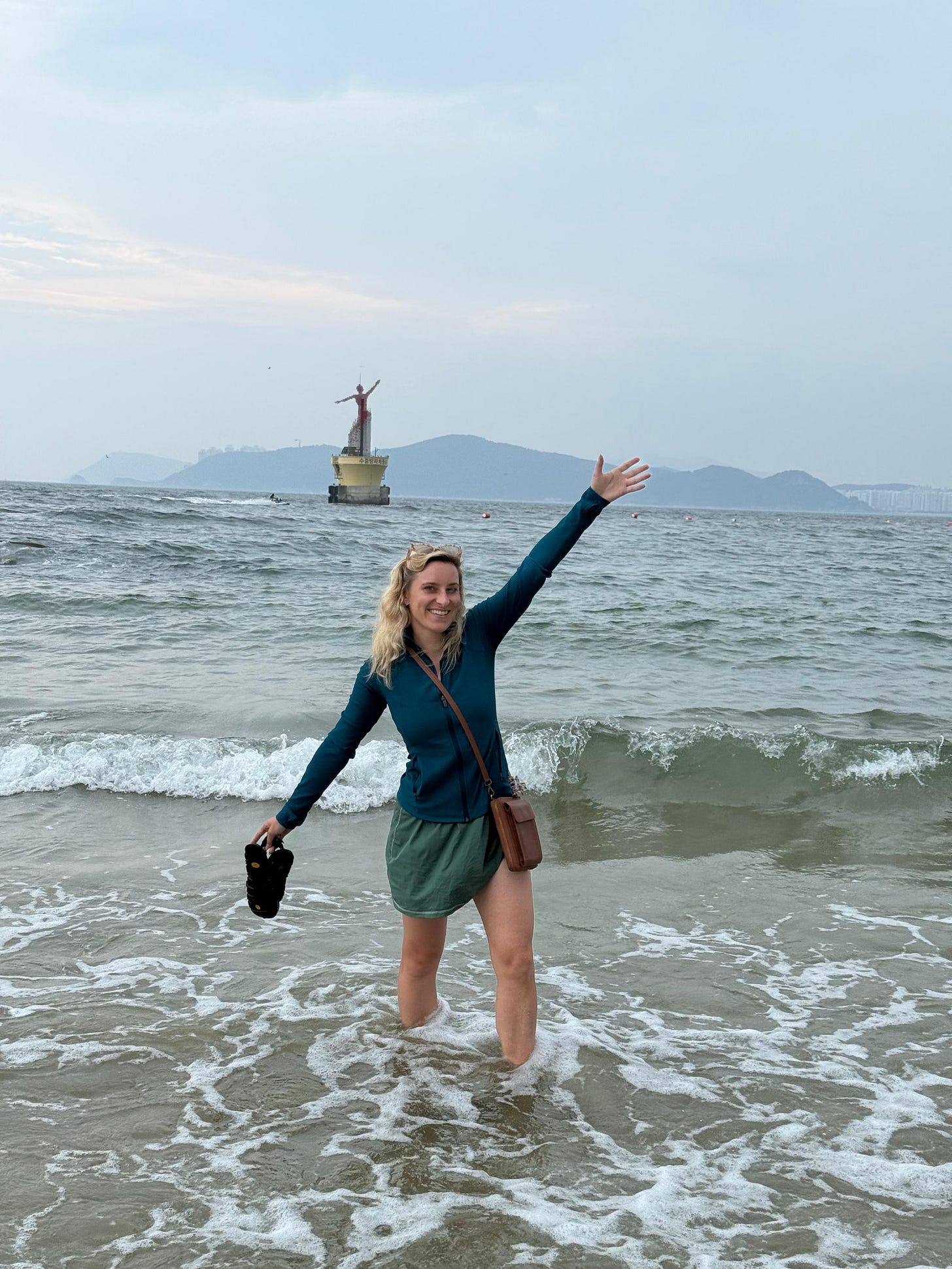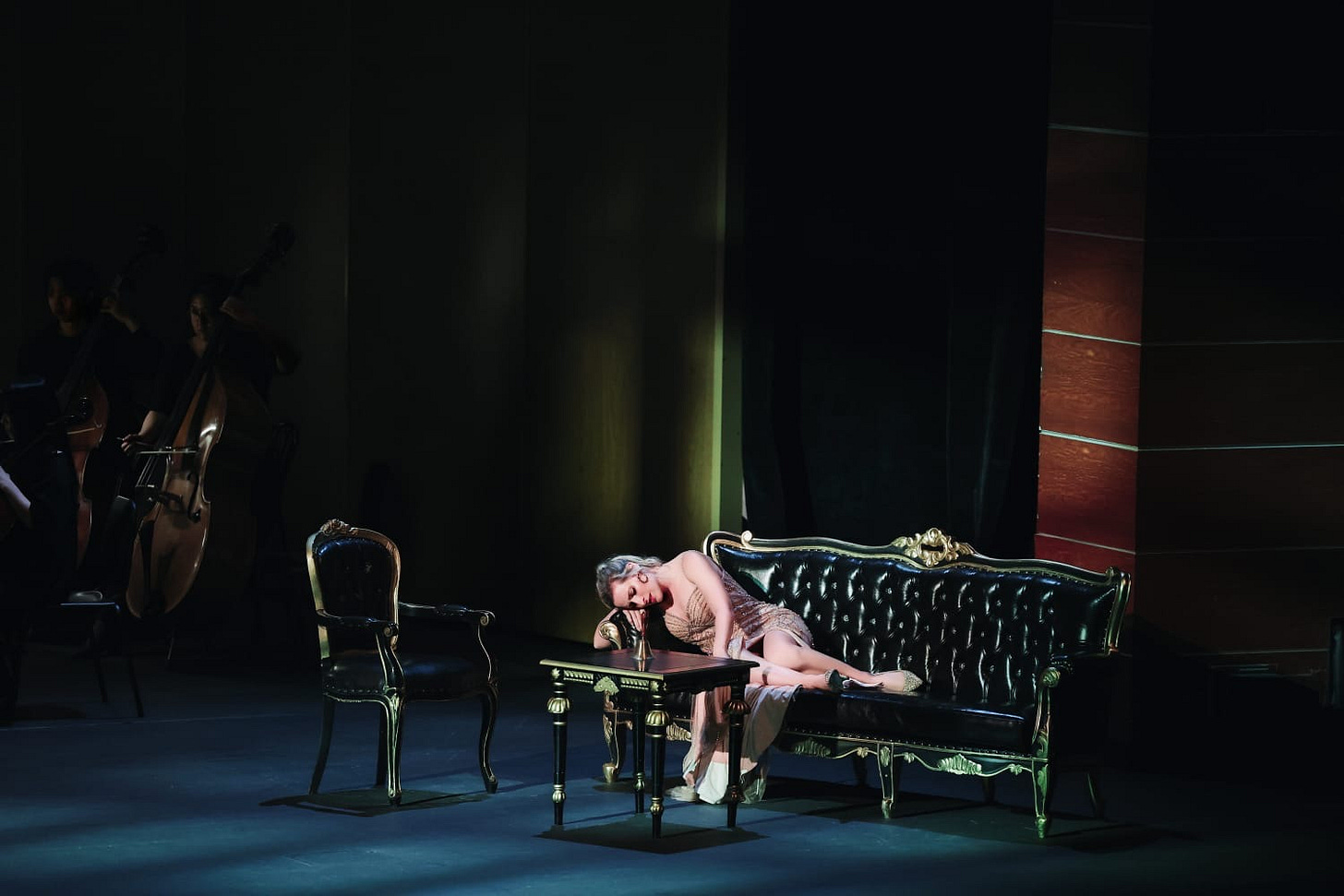Staring Down Self-Doubt
Why doubt is a feature of big challenges - and how to make peace with it
It’s early in the morning. I mean early. I woke up at 5:45 because my body has no idea what time zone it’s in - all I know is that I’m that cozy kind of tired. The “in PJs on the couch with dark rainy German weather outside and my dog snoring at my feet” kind of tired. My partner’s at the gym, and I have my own “home coffee” exactly the way I like it.
And I realize it’s the first moment I’ve had alone in two months of traveling where I can finally sit and get some thoughts out.
Over the years, I’ve discovered that each role comes with a life lesson or two. Each one changes you in some way - it’s probably the whole “embodying the character” thing. Preparing and debuting Violetta has been no different. In fact, I’d say this experience has been pivotal for how I view myself as an artist, what my voice is capable of, and where I’m headed next.
I guess you could call it “growth and development as a singer.” But to the singer? It feels deeply personal.
So here’s my biggest takeaway from debuting Violetta:
Self-doubt is a feature of challenging yourself — not a problem to be solved or avoided.
Doubt is Normal
Every role debut comes with some doubt. For me, it usually shows up in the form of comparison questions:
Is it okay that I need to breathe here when singer-so-and-so doesn’t?
Will the audience care that I can’t hold this note as long as whoever in whatever famous recording?
Will the conductor notice my messa di voce is still a work in progress (and probably always will be)?
What if I forget the words?
Honestly, after so many years, these questions have become… delightfully mundane. They’re the white noise of self-doubt. They ebb and flow in a predictable pattern throughout rehearsals. So predictable, actually, that I don’t fight them anymore. I just accept them as noise.
The Violetta-Level Doubt
But Violetta was different for me. This role brought a whole new level of self-doubt. Looking back through my practice journal from the past 4–5 months, I can see myself wrestling with the magnitude and endurance of the role.
And I realize why.
I had to confront old baggage about my voice. Years of critical voices — people saying my instrument was too small, that I wasn’t suited for this fach, that I wasn’t “womanly” enough, that I didn’t fit the depth of the role. My vibe wasn’t serious enough.
But I’ve had a deep connection to this music for years. I knew there was something there for me to say. So in the practice room, I had to go to war with those voices — the external ones and the internal ones.
So I broke out my practice journal and started writing those thoughts down to give myself space from them, instead of letting them swirl endlessly in my head. I had to figure out what my self-doubt was trying to tell me.
My Big Takeaway:
And that’s when the real takeaway clicked for me:
The struggle in the practice room is part of the process. Not something to be avoided
Doubt is proportional to the size of the challenge.
If the role feels massive, the doubt will too.
It’s not a sign you’re failing. It’s a sign you’re taking on a worthy challenge.
Steven Pressfield says in The War of Art:
“Are you paralyzed with fear? That’s a good sign. Fear is good. Like self-doubt, fear is an indicator. Fear tells us what we have to do.”
The truth is: doubt isn’t a problem to be avoided. It’s the built-in feature of doing something that stretches you.
But here’s the catch: while doubt may be normal, it’s still our job to rise to the challenge it presents. To walk onstage and see if the work pays off. To prove something to yourself.
The terrifying (and thrilling) part? You never really know if you can do something until you do it. That’s the contract we sign as performers. That is the risk we have to take to create something.
Self-doubt is just the price of admission to be the one standing on the stage singing instead of sitting in the audience.
How You Can Use This
If you’re in the middle of preparing something big, notice your doubt. Let it be background noise, not the main voice.
Write it down in your journal (seriously, I can’t recommend it enough).
Remind yourself: the size of your doubt matches the size of your challenge.
If you want structured support for this, you’ve got options:
Try the Practice Journal Method — the exact tool I used to track my thoughts while preparing Violetta.
Join the 30 Days of Vocal Exercise Challenge — a structured way to build confidence and consistency in your practice. It’s all of my exercises PLUS a lot of my philosophy and little lessons I’ve learned in the last decade of professional singing.
✉️ And if you’re not subscribed to this newsletter yet… do it. You’ll get my next deep-dive reflections straight to your inbox
Let’s talk
What role, project, or challenge has brought up the loudest self-doubt for you? Did it mean you were failing — or stretching?
Hit reply, drop a comment, or write it in your own journal. Just… don’t let those voices have the final word.
xoxo,
Martha




Martha, I adore this reflection. As I’m preparing for a concert of opera favorites at the end of this month, I so resonate with the questions of “ will the audience care if I don’t hold this note/sing this cadenza like singer/recording whatever?” And the need to go to war with your own thoughts in the practice room. Such an important discussion!
I took a playwriting class this summer and wrote a full length play in two months that was workshopped last night, actually. Throughout the process it was this seesaw of “I *know* I can do this.” and “I am writing a piece of crap.” I never got too lost in the spiral but the doubt was there. But every time it got too loud, I’d step away for a minute to let myself and the writing breathe and then I could come back with a clear head, focused on the work rather than the doubt. Reading your piece was so affirming and it’s something I’m going to keep in mind moving forward in my creative projects. Thank you for this.